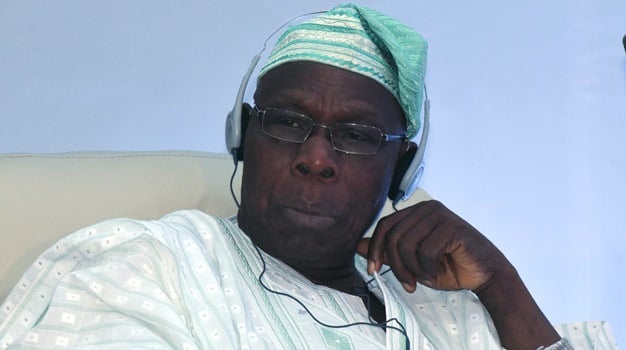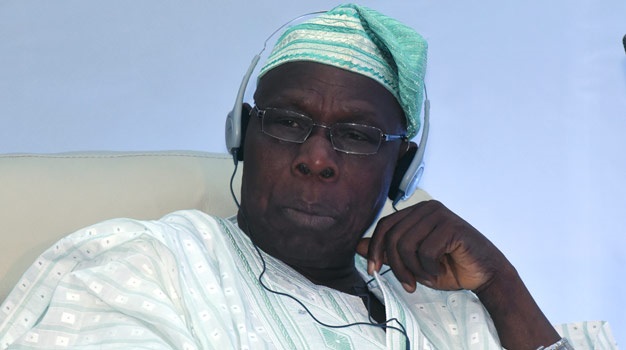

Olusegun Obasanjo. (File: AFP)
- Olusegun Obasanjo called on the Pan African Parliament to stand up against coups.
- Legitimising the coup in Zimbabwe in 2017 was a bad example, he said.
- From 2010 to date, there were 46 attempted overthrows of governments in Africa.
A coup cannot be disguised as a democratic process and Africans have boldly shown that they do not condone any form of selfish interests by politicians, said a former Nigerian president and top diplomat.
The former president of Nigeria and African Union (AU) high representative for the Horn of Africa, Olusegun Obasanjo, addressing the Pan-African Parliament (PAP) first ordinary session, said “citizens of Africa have been able to shun leaders who amend the constitution, intending to personally gain from such amendments”.
From 2010 to date, there were 46 attempted overthrows of governments in Africa through coups and other unconstitutional means.
Of those, 14 were outright coups and 32 were foiled.
On 3 July 2013, there was a coup in Egypt, which brought in General Abdel Fattah el Sisi as the sixth and current president.
Thereafter, there were failed attempts: four in Libya, one in the Democratic Republic of Congo, one in Lesotho, one in Burundi, two in Gambia and two in Burkina Faso.
The next successful coup since Egypt was in November 2017 in Zimbabwe, which brought President Emmerson Mnangagwa into office.
READ | African Union condemns latest Burkina Faso coup
The Zimbabwe case, for Obasanjo, set a bad example that coups can be branded as legitimate takeovers.
“There should be no half measures about these. It started in Zimbabwe, where they said, ‘it’s not a coup and it’s a half coup, it’s near a coup’ – a coup is a coup,” he said at the PAP meeting in Midrand, South Africa.
Soon after the takeover in Zimbabwe, a judge with a military background, George Chiweshe, ruled that the army had moved in to stop people around Robert Mugabe (his allies) from taking over his constitutional functions.
This was in line with the military’s announcement that it was targeting criminal elements around Mugabe.
Since the Zimbabwe coup, there have been eight more coups concentrated in West Africa, the last one on 30 September in Burkina Faso, ushering in the world’s youngest leader – Captain Ibrahim Traore.
Obasanjo challenged PAP to take a lead in denouncing conflict, coups and unconstitutional change of power.
“You have power and you must not let anyone dictate that power. For instance, you can discuss, examine and make recommendations to policy organs on your initiative.
“Your Committee on Cooperation, International Relations and Conflict Resolution should be at the forefront of leading initiatives involving peace-building across the continent as we try to contain instability in the face of unconstitutional changes of government.
“There’s a lot to do if we are to achieve peace, and this body has a central role to play,” he said.
Obasanjo is basking in the glory of moving forward the AU’s “Silencing the Guns” initiative, with the Ethiopian civil war cessation of hostilities deal signed by warring parties.
However, he said it was not easy to reach an agreement.
“It wasn’t easy for us to achieve a Peace Agreement in Ethiopia. The process is challenging, long and frustrating, but because we are determined to see peace and stability in Africa, we managed to bring together the warring parties to the table to convey our vision for a united Ethiopia. We had to be neutral, friendly and appreciative to everyone, despite whatever reservations we had,” he said.
If they could find a solution for Ethiopia, Obasanjo said, it could be done in other parts of the continent.
The first ordinary session of the sixth Parliament of the PAP was held under the African Union theme for 2022: “Building resilience in nutrition on the African continent: Accelerate the human capital, social and economic development”.
The News24 Africa Desk is supported by the Hanns Seidel Foundation. The stories produced through the Africa Desk and the opinions and statements that may be contained herein do not reflect those of the Hanns Seidel Foundation.

